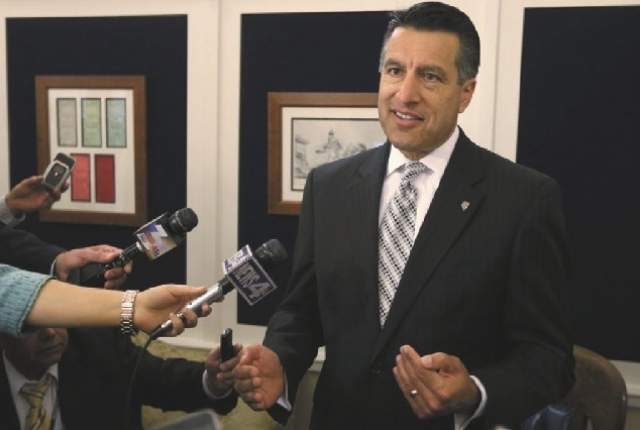For Sandoval, a good-news kind of weekend

Gov. Brian Sandoval had a good winter meeting of the Western Governor’s Association.
First, Energy Secretary Ernest Moniz repeated the fact that current administration policy is most definitely anti-Yucca Mountain, even if continued use of nuclear power remains part of the federal government’s “all of the above” energy strategy.
“We are committed to nuclear power as an option,” Moniz told attendees at the association’s meeting, held this weekend at the Four Seasons hotel. (Sandoval is the current chairman of the association.)
When it comes to nuclear waste, however, Moniz and the Energy Department have much different ideas than burying it in Yucca Mountain. “We don’t think Yucca Mountain is workable, plain and simple,” Moniz said.
In fact, he said an alternative idea could be underway in about eight years, a pilot project that would consolidate nuclear wastes in above-ground, dry cask storage, starting with waste that is stored at closed nuclear plants that have long since ceased to produce energy. At the same time, the government can begin its search anew for a deep geological repository. But both initiatives would occur in a “consent-based” process, rather than the adversarial process that has characterized the Yucca fight for decades.
Second, Interior Secretary Sally Jewell said the government’s preference is not to list the sage grouse as an endangered species, a move that could place thousands of acres across 11 western states off limits to recreation, ranching, energy development and other uses.
Jewell said her department is working with states, private landowners, developers and others in an “epic collaboration” to ensure protections for the sage grouse that will satisfy the Fish & Wildlife Service, which must decide by Sept. 15, 2015 whether the bird needs Endangered Species Act protection. “We share a goal, to avert the listing,” Jewell said.
But she said the sage grouse ecosystem is one of the most imperiled in the United States, thanks to suburbanization, development of energy resources, invasive species and wildfires, which Jewell said have grown worse because of global climate change.
“It’s not just the sage grouse that’s at stake. It’s the Western way of life that’s at stake,” Jewell said. “We have a window of opportunity.”
Sandoval — and many of his fellow governors who attended the conference — couldn’t have much happier to hear that.
GOVERNOR ON POLITICS
Four of the governors who attended the Association’s meeting (including Sandoval), sat down with the Washington Post’s Reid Wilson Sunday morning for a chat that ranged form politics to policy and back. Sandoval held up a map of Nevada, with federally controlled lands depicted in red, to show the audience how 87 percent of Nevada’s land is controlled by Washington, D.C.
“Are those Republican areas?” fellow Gov. Gary Herbert of Utah joked.
“They were this year,” Sandoval shot back.
Asked by Wilson about the message the Republican Party should be sending, Sandoval struck a moderate tone, as is his wont. “There are a lot of people who got elected in Nevada who didn’t expect to, who I didn’t expect to,” Sandoval said, referring to a Republican wave that swept the GOP into control of the state Assembly for the first time since 1985.
The Republicans have stumbled in the days since, first electing Sparks Republican Ira Hansen speaker, but watching as revelations of racist, sexist and homophobic columns he penned for the Sparks Tribune forced him to step down from the leadership post. Then last week, the Republicans installed Las Vegas Republican John Hambrick as speaker, but put conservatives in every other leadership post, including Michele Fiore, R-Las Vegas, as majority leader, Hansen as assistant majority leader and Jim Wheeler, R-Minden, as whip. (Minden is famous for saying he’d reluctantly vote to bring back slavery if his constituents backed it.)
Fiore has since said the caucus would not step back from pursuing bills that were rejected in the past, when Democrats controlled the Assembly.
For his part, however, Sandoval said the leadership opportunity comes with a challenge. “If they go too far, they’re not going to be the speaker, or the majority leader two years from now,” he said. “There’s a very narrow window to show that they can lead, to show that we can lead.”
Sandoval said his practice is to meet with all new lawmakers to discuss their goals and priorities for the coming session, and he has his work cut out for him, with two new state senators and 16 new Assembly members, including the yet-to-be-named replacements for Assemblyman Wes Duncan, R-Las Vegas, who resigned to go to work for Attorney General-elect Adam Laxalt, and David Bobzien, D-Reno, who resigned to accept an appointment to the Reno City Council.
“My No. 1 priority, then as now, is to strengthen education,” said Sandoval, once the association meeting had wrapped. But he acknowledged that a crucial part of meeting that goal would be examining new revenue, a concept he acknowledged had become more challenging with the newly elected Republican majority, some of whom campaigned against tax increases.
Asked if he will build a tax increase into his budget for introduction during his State of the State message Jan. 15, Sandoval only smiled and said, “You’ll find out.”
Oh, and for those who persist in entertaining the idea that Sandoval is considering a bid for U.S. Senate in 2016 against incumbent Sen. Harry Reid, the governor said he was too busy planning for the session to contemplate his next political move.